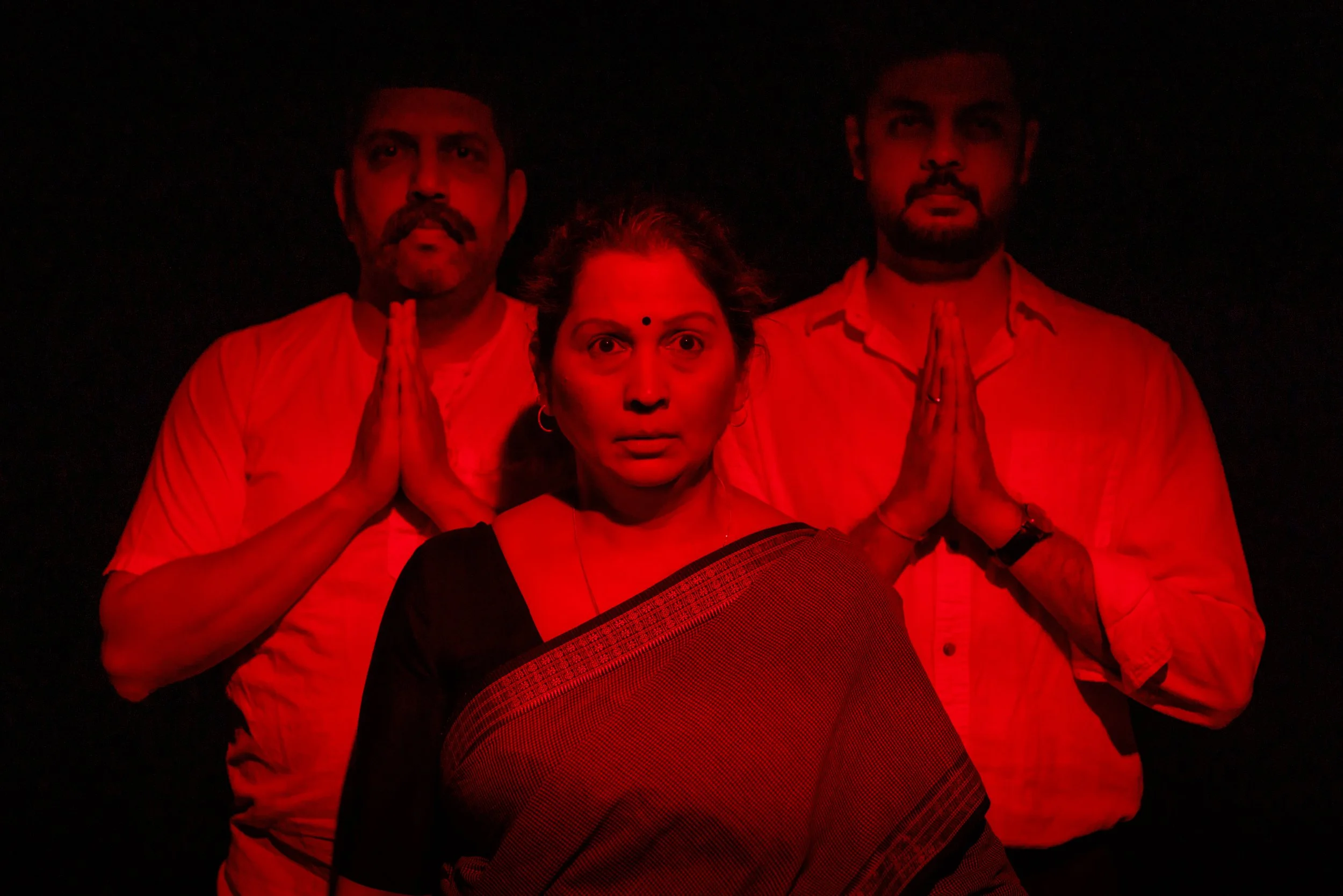REVIEW: More Marathi theatre please—Bandini makes a case
Bandini is a stageplay written by Nilesh Gadre, and presented as part of La Mama’s Festival of Mother Tongues with MiTheatre, between 14 - 16 November at La Mama HQ.
Language: Marathi, with English open captions
Performed by: Reshma Parulekar, Shantanu Bendre, Nilesh Gadre, Chaitanya Khare, Suhasini Solapure, Anita Gupte
Directed by: Nilesh Gadre
Reviewed by: Parth Rahatekar
Image by Darren Gill.
Trigger warning: The play deals with stories of abuse — sexual, mental and physical, and can be extremely triggering for audiences.
Seated in La Mama’s HQ, I sense a certain eagerness creep over me. Here I am, ready to watch Bandini — the only Marathi play that’s part of the lineup at La Mama’s Festival of Mother Tongues. I’ve never been here before, but this eagerness feels familiar. It took me a while to realise where it was coming from. I’ve only felt this in Pune before — seated at Balgandharva Rangmandir, ready to revel in the inexplicable delight only Marathi theatre can bring.
The curtains open to Devyani Deshpande, our protagonist (played by Reshma Parulekar) finding out she’s been awarded the highest honour for women by the government. Just before a reporter (Anita Gupte) comes to interview her, her maternal uncle or maama (Nilesh Gadre) shows up, unannounced. The tension is immediate, and visible through Reshma’s performance. It becomes clear — there is a tenuous history here. The characters tussle in classic Marathi fashion, through tales and tomne (taunts) — and Bandini’s writing begins to shine. This is my yardstick to measure good Marathi theatre. A good writer can enthuse lightness and levity, even when it grapples with heavy subjects, which Bandini does, when they effectively weave in the kind of easy humour characteristic of Marathi culture. A good actor can deliver these spurts of humour without seeming campy. Both Nilesh and Reshma excel in this area. Their prowess over acting further shines when they slip into a surreal, nostalgia-fuelled interaction. The initial tension melts for a second, and you are along the Konkan coast where this narrative of memory is happening. The audience is almost tricked. Was the tension only imagined?
It circles back immediately when the reporter enters, and Devyani has to usher maama away into her room. In another surreal bout of memory in the middle of the interview with the reporter, we meet Prof. Dhananjay Deshpande (Shantanu Bendre), Devyani’s husband. The play begins to weave in and out of surreal interactions, and layers them further. Professor Dhananjay breaks the fourth wall often, and addresses the audience as his students. I think this could have been handled slightly deftly, rather than in the outward manner that it happens in. It begins to get slightly tiresome after the first few times, especially since the lectures that the professor delivers are triggering and can fatigue the audience. The other critique I have is that Shantanu, while really good at his craft, is slightly too young to play Devyani’s husband. I mistook him for her son at first.
Soon, the play begins to cycle through interactions between Devyani, her mama, and her husband. It begins to coil with anger, passion, accusations and tension in this section — which bursts forth in one of the most riveting scenes and monologues delivered by Devyani, right before we enter the third act. This begins with Amol Deshpande (Chaitanya Khare) and his girlfriend Kaku (Suhasini Kolhapure) coming home to congratulate Devyani, and play coy romantic games. Chaitanya is a delight to watch. His performance as Amol is charming from the start to end. I would have liked to see more of Suhasini too, I don’t think she had ample room to showcase her capabilities in this play, or perhaps, is still finding her feet with this character.
As the play veers towards its explosive, unexpected ending, we find ourselves reckoning with a few questions: What makes an abuser? Does being wronged justify doing wrong? And more importantly, how many times does the world have to fail a woman, before the woman fails her world?
Bandini is a provoking watch, no matter where you find yourself in these introspections. The performers are able to tap into the writing well — which is well structured, and impactful. It can benefit from slight editing — especially in how many mythological references it overtly makes, or how it deals with breaking the fourth wall. If you’re new to Marathi theatre, you will enjoy it thoroughly. If you’re seasoned, you may walk away with a lot to love and think about. Either way, it’s a play MiTheatre should be proud of.
This review is part of MAV’s initiative to foster culturally responsive theatre criticism, amplifying diverse voices and perspectives in the arts. By inviting writers, storytellers and artists to review the works of fellow creatives through the lens of shared lived, or cultural experiences, we aim to highlight the importance of theatre reviews that challenge dominant narratives and provide deeper, culturally grounded perspectives.

